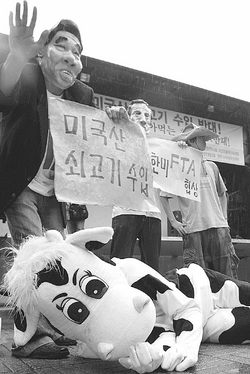 |
|
Protestors gather in Seoul on June 11 to protest U.S. demands that South Korea lift a ban on importing its beef following several Mad Cow Disease scares. The demands have been repeatedly made by the U.S. at the first round of free trade talks between the two nations, held in Washington last week. Lee Jeong-a
|
Overall, however, it looks like Korea gave up far more than it came away with. The fact that drafts were not written for sectors that would be to Korea’s advantage is evidence to this end. Some say that Korea’s negotiators came back empty-handed. Even more disappointing was the attitude of the Korean negotiators. The Americans applied pressure using specific demands in areas in which they have an advantage, and in areas in which they are at a disadvantage they applied aggressive defense tactics. The South Korean side, however, consistently made it seem as if their approach was to compromise on anything, so as to keep the negotiations going, no matter what. The South Korean delegation, however, said the key is actually going to be turning around the opinion of those in the public who oppose an FTA; the negotiators also accused street protesters in Washington of being harmful to Korea’s national interest. The second round of negotiations is going to be held in Seoul next month, at which time each side will begin the ritual of exchanging follow-up proposals. We already know what the results are going to be if Korea continues with the same low-level posturing it demonstrated when it accepted a lower "screen quota," or percentage of domestic movies that must be shown in Korean theaters, U.S.’s precondition for the FTA talks. It must be remembered that Korea’s interests cannot be protected with an attitude that makes it seem as if Seoul is obsessed with getting any kind of agreement signed.





